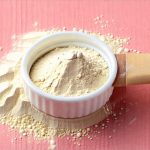Protein powder has become incredibly popular in recent decades, evolving from a niche supplement for bodybuilders into a mainstream component of many people’s diets. Driven by marketing emphasizing muscle growth, weight management, and convenient nutrition, protein powders are now readily available in countless flavors and formulations. This widespread adoption means more individuals are incorporating significant amounts of supplemental protein into their daily routines, often without fully understanding the potential consequences. While generally considered safe for most healthy adults when used appropriately, an increasing number of anecdotal reports and emerging research suggest a possible link between long-term, high-dose protein powder consumption and digestive issues, particularly constipation.
The allure of protein powders stems from their convenience and perceived health benefits. For individuals with demanding lifestyles or specific dietary needs, they offer a quick and easy way to boost protein intake. However, it’s crucial to remember that these supplements are designed to supplement a balanced diet – not replace whole food sources entirely. Reliance on protein powder as a primary source of nutrition can inadvertently lead to imbalances in the gut microbiome and overall digestive health. Moreover, many formulations contain additives like artificial sweeteners, thickeners, and emulsifiers which may exacerbate gastrointestinal distress in susceptible individuals. This article will delve into the potential mechanisms by which long-term protein powder use might contribute to constipation, exploring both the inherent properties of the powders themselves and how they interact with our digestive systems.
The Role of Protein & Fiber Imbalance
The fundamental issue connecting protein powder use and constipation often lies in an imbalance between protein and fiber intake. When increasing protein consumption, particularly through supplemental sources, many individuals fail to simultaneously increase their fiber intake. This creates a situation where the body receives ample building blocks for muscle repair but lacks sufficient bulk to facilitate healthy bowel movements. Fiber acts as the primary regulator of intestinal motility, adding substance to stool and encouraging regular evacuation. Without adequate fiber, the digestive process slows down, leading to harder stools that are more difficult to pass.
Protein itself doesn’t directly cause constipation; rather, it’s the lack of accompanying dietary adjustments that creates the problem. A diet overly focused on protein can displace other essential nutrients, including fiber-rich foods like fruits, vegetables, and whole grains. It is vital to understand that a healthy digestive system requires a holistic approach – not just focusing on one macronutrient. Furthermore, certain types of protein powders are less digestible than others (more on this later), which can further contribute to slower transit times in the gut and increased risk of constipation.
It’s important to note that dehydration is often intertwined with high-protein diets. Protein metabolism requires more water than carbohydrate or fat metabolism. If fluid intake isn’t increased alongside protein consumption, the body may pull water from the colon, resulting in drier stools and exacerbating constipation. Therefore, a comprehensive approach addressing both fiber and hydration is crucial when considering long-term protein powder use. Understanding how gut diagnostics connect to overall health can also provide valuable insights.
Protein Powder Formulation & Gut Health
The specific formulation of a protein powder can significantly impact its potential to cause or worsen constipation. Different protein sources – whey, casein, soy, pea, rice, hemp, etc. – are digested at varying rates and have different effects on the gut microbiome. Whey protein, for instance, is relatively quickly absorbed, which may not provide sustained satiety but can also contribute to faster transit times in some individuals (although it doesn’t necessarily guarantee regular bowel movements). Casein protein, conversely, digests much slower, potentially leading to longer periods of fermentation in the gut and a greater risk of bloating and constipation.
Many protein powders contain additives designed to enhance flavor, texture, or shelf life. These additives – including artificial sweeteners like sucralose or aspartame, thickeners like xanthan gum or guar gum, and emulsifiers like lecithin – can disrupt the delicate balance of the gut microbiome. A compromised microbiome is less efficient at processing food, leading to increased gas production, bloating, and altered bowel habits. Some individuals are particularly sensitive to these additives, experiencing significant digestive distress even with small amounts. Exploring tools doctors use to assess gut health can be helpful in identifying sensitivities.
Furthermore, some protein powders may contain lactose (in whey concentrate) or other compounds that can trigger symptoms in people with sensitivities or intolerances. These undigested components can draw water into the intestines, leading to diarrhea or, paradoxically, constipation as the body attempts to compensate for fluid loss. Choosing a protein powder with minimal additives and considering your individual tolerances is crucial for minimizing digestive discomfort. It’s also worthwhile to consider stool-based options when monitoring inflammation levels.
Identifying & Addressing Protein Powder-Related Constipation
If you suspect that long-term protein powder use might be contributing to your constipation, several steps can help identify and address the issue:
- Evaluate Your Fiber Intake: This is often the first and most important step. Most adults need between 25-35 grams of fiber per day. Track your current intake for a few days using a food diary or app and assess whether you’re meeting this recommendation. Increase your consumption of fiber-rich foods such as:
- Fruits (berries, apples, pears)
- Vegetables (broccoli, spinach, Brussels sprouts)
- Whole grains (oats, quinoa, brown rice)
- Legumes (beans, lentils)
- Increase Hydration: Drink plenty of water throughout the day, especially before, during, and after exercise. Aim for at least eight glasses per day, and adjust based on your activity level and climate. Dehydration worsens constipation, making it harder to pass stools.
- Consider Protein Powder Alternatives: If you suspect a particular protein powder is causing issues:
- Switch to a different protein source (e.g., pea protein if whey causes problems).
- Choose powders with minimal additives and artificial sweeteners. Look for “clean” formulations with short ingredient lists.
- Reduce your overall protein powder intake and prioritize whole food sources of protein.
The Importance of Gut Microbiome Support
A healthy gut microbiome is essential for regular bowel movements and overall digestive health. Long-term protein powder use, particularly when coupled with a low-fiber diet, can negatively impact the microbiome’s diversity and function. Supporting your gut microbiome can help alleviate constipation and improve digestion:
- Probiotic Foods: Incorporate probiotic-rich foods into your diet, such as yogurt (with live cultures), kefir, sauerkraut, kimchi, and kombucha.
- Prebiotic Foods: Prebiotics are food for the beneficial bacteria in your gut. Include prebiotic-rich foods like onions, garlic, leeks, asparagus, bananas, and oats in your meals.
- Consider a Probiotic Supplement: If dietary changes aren’t enough, you might consider consulting with a healthcare professional about taking a probiotic supplement. Choose a high-quality supplement with multiple strains of beneficial bacteria. Health checks recommended after changes to diet can be beneficial, too.
Consulting With Healthcare Professionals
It’s crucial to remember that constipation can be caused by various factors beyond protein powder use. If your constipation is severe, persistent, or accompanied by other symptoms like abdominal pain, bloating, nausea, or changes in stool caliber, consult a healthcare professional. Self-treating can mask underlying medical conditions. A doctor can help determine the cause of your constipation and recommend an appropriate course of action, which may include dietary modifications, lifestyle changes, medication, or further testing. Do not rely solely on online information for diagnosis or treatment. A registered dietitian can also provide personalized guidance on optimizing your diet to support digestive health while continuing to meet your protein needs. Digestive diagnostics linked to other health factors may be worth exploring if you have ongoing issues, and understanding approaches to testing when constipation is intermittent can help pinpoint the cause. Finally, tests doctors use to differentiate between gas and inflammation can be useful in diagnosis.


















